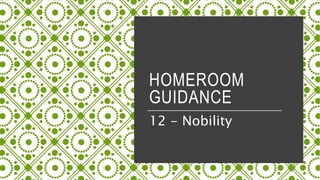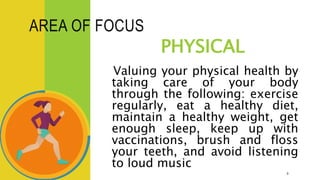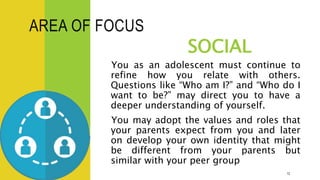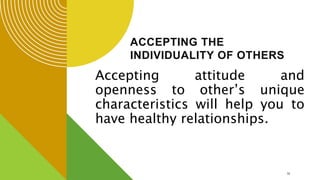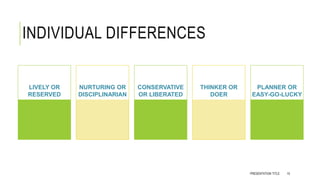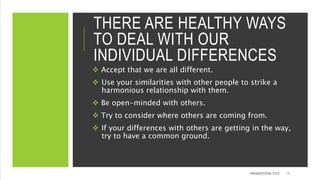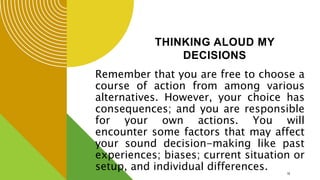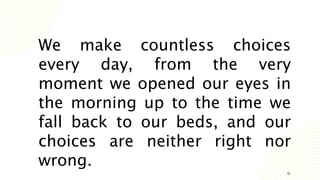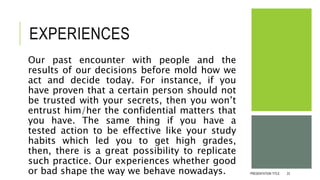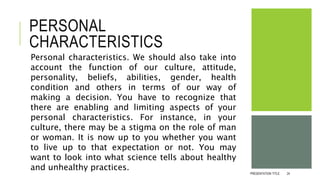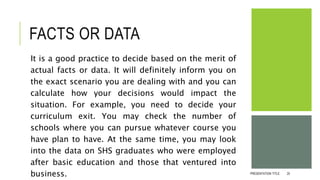HG1 PPT.pptx
- 2. TOPIC Self-Analysis: A Step to My Improvement Accepting the Individuality of Others Thinking Aloud My Decisions
- 3. SELF-ANALYSIS: A STEP TO MY IMPROVEMENT Since people like you are in constant change where family, school, community and others play a vital role, you have to be mindful on your strengths and weaknesses. 3
- 4. ACTIVITY 1 ASSESS YOURSELF a) Your facial structure b) The circle of friends that you have c) Your current academic performance d) Living with family e) Personal relationship with God f) Your current relationship status g) Your body posture h) Attitude towards difficulties in life
- 5. QUESTION What strengths and weaknesses have you noticed or identified?
- 7. PRESENTATION TITLE 7 Personal Goal Stop Minimize Continue Improve Start Better grades for this year Using gadgets for gaming Sleeping late at night Keeping my notes orderly Reading in advance Developing a daily personal study plan 1 2 3 4 5
- 8. FOCUS OF IMPROVEMENT PRESENTATION TITLE 8 PHYSICAL MENTAL MIND EMOTIONAL FEELINGS SOCIAL RELATIONSHIPS SPIRITUAL SPIRIT BODY
- 9. AREA OF FOCUS PHYSICAL Valuing your physical health by taking care of your body through the following: exercise regularly, eat a healthy diet, maintain a healthy weight, get enough sleep, keep up with vaccinations, brush and floss your teeth, and avoid listening to loud music 9
- 10. AREA OF FOCUS MENTAL 10 It is important for you to maintain good mental health habits, including coping, resilience, and good judgment among your age group to achieve overall wellbeing. It sets the stage for positive mental health in adulthood. You as an adolescent must remember that talking about your feelings with a trusted person can help.
- 11. AREA OF FOCUS EMOTIONAL The adolescent healthy emotional development is marked by a gradually increasing ability to perceive, assess, and manage emotions. This is a biological process driven by physical and cognitive changes and heavily influenced by context and environment. The process of emotional development gives you the opportunity to build skills, discover unique qualities, and develop strengths for optimal healthy emotion. 11
- 12. AREA OF FOCUS SOCIAL You as an adolescent must continue to refine how you relate with others. Questions like “Who am I?” and “Who do I want to be?” may direct you to have a deeper understanding of yourself. You may adopt the values and roles that your parents expect from you and later on develop your own identity that might be different from your parents but similar with your peer group 12
- 13. AREA OF FOCUS SPIRITUAL Religion has a strong influence on our country even up to now. The teenagers who are guided and nurtured by a clear belief system and spiritual activities are much less likely to go off the rails during adolescence. 13
- 14. ACCEPTING THE INDIVIDUALITY OF OTHERS Accepting attitude and openness to other’s unique characteristics will help you to have healthy relationships. 14
- 15. INDIVIDUAL DIFFERENCES PRESENTATION TITLE 15 LIVELY OR RESERVED NURTURING OR DISCIPLINARIAN CONSERVATIVE OR LIBERATED THINKER OR DOER PLANNER OR EASY-GO-LUCKY
- 16. SHOWING SUPPORT TO OTHERS 16 Situation Physically Emotionally Socially Spiritually 1. A new classmate with a physical disability 2. A friend who lost his parents due to an accident 3. A neighbor who chose to stop schooling for employment 4. A sibling who spends most of his/her time playing online games 5. A friend who plans to leave their house because of a family problem 6. A new group member who loses hope because of many problems 7. A cousin from an ethnic group who is still adjusting to her new school 8. A relative who is confused with his gender preference 9. A classmate who experiences social discrimination due to his poor academic performance 10. An older sibling who needs help with time management
- 17. THERE ARE HEALTHY WAYS TO DEAL WITH OUR INDIVIDUAL DIFFERENCES Accept that we are all different. Use your similarities with other people to strike a harmonious relationship with them. Be open-minded with others. Try to consider where others are coming from. If your differences with others are getting in the way, try to have a common ground. PRESENTATION TITLE 17
- 18. THINKING ALOUD MY DECISIONS Remember that you are free to choose a course of action from among various alternatives. However, your choice has consequences; and you are responsible for your own actions. You will encounter some factors that may affect your sound decision-making like past experiences; biases; current situation or setup, and individual differences. 18
- 19. 19 We make countless choices every day, from the very moment we opened our eyes in the morning up to the time we fall back to our beds, and our choices are neither right nor wrong.
- 20. STRATEGIES TO PROMOTE CHANGE AND FORESEE THE POSSIBLE WRONG DECISIONS AND FUTURE ACTIONS According to American psychologist Gerald Corey: 1. Explore what your wants, needs and perceptions are. Try to recognize, define, and refine how you wish to meet your needs. 2. Focus on what you are doing at present and think of your future direction. Take action by changing what you are doing and thinking. 3. make a self-evaluation. It is your responsibility to evaluate your own behavior. 4. Formulate your action plan. Creating and carrying out your plans enable you to gain more effective control over your life. If your plan does not work, devise a different plan. Your commitment is essential to carry out your plans. PRESENTATION TITLE 20
- 21. FACTORS THAT AFFECT OUR DECISIONS Environment Experiences Personal characteristics Facts or data Motivation PRESENTATION TITLE 21
- 22. ENVIRONMENT The people around us including the current setup affect the way we see things. They can influence our beliefs and perception on the consequences of our actions. There are times that we intend to compare how they face a certain problem with the way we face it ourselves; this is something that we need to get away from as we are all different including the situations we are PRESENTATION TITLE 22
- 23. EXPERIENCES Our past encounter with people and the results of our decisions before mold how we act and decide today. For instance, if you have proven that a certain person should not be trusted with your secrets, then you won’t entrust him/her the confidential matters that you have. The same thing if you have a tested action to be effective like your study habits which led you to get high grades, then, there is a great possibility to replicate such practice. Our experiences whether good or bad shape the way we behave nowadays. PRESENTATION TITLE 23
- 24. PERSONAL CHARACTERISTICS Personal characteristics. We should also take into account the function of our culture, attitude, personality, beliefs, abilities, gender, health condition and others in terms of our way of making a decision. You have to recognize that there are enabling and limiting aspects of your personal characteristics. For instance, in your culture, there may be a stigma on the role of man or woman. It is now up to you whether you want to live up to that expectation or not. You may want to look into what science tells about healthy and unhealthy practices. PRESENTATION TITLE 24
- 25. FACTS OR DATA It is a good practice to decide based on the merit of actual facts or data. It will definitely inform you on the exact scenario you are dealing with and you can calculate how your decisions would impact the situation. For example, you need to decide your curriculum exit. You may check the number of schools where you can pursue whatever course you have plan to have. At the same time, you may look into the data on SHS graduates who were employed after basic education and those that ventured into business. PRESENTATION TITLE 25
- 26. MOTIVATION Our drive to achieve certain things influences our decisions. Sometimes we need to let go of small things in order to attain greater things. For example, you slipped away your opportunity to be with your friends on a Saturday because it’s your schedule for college application interview. Your goal to be a college graduate is bigger than your desire to enjoy the company of your friends, so you opted to be at the interview. PRESENTATION TITLE 26
